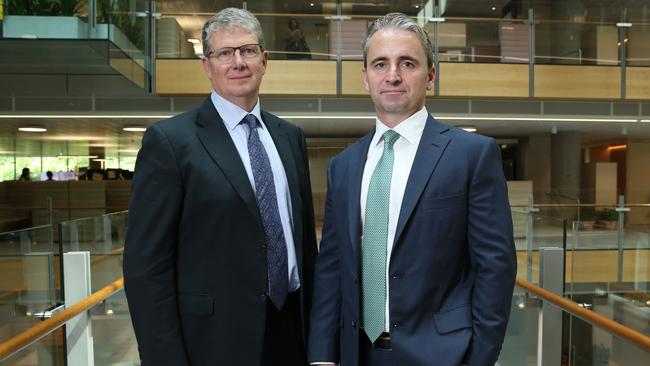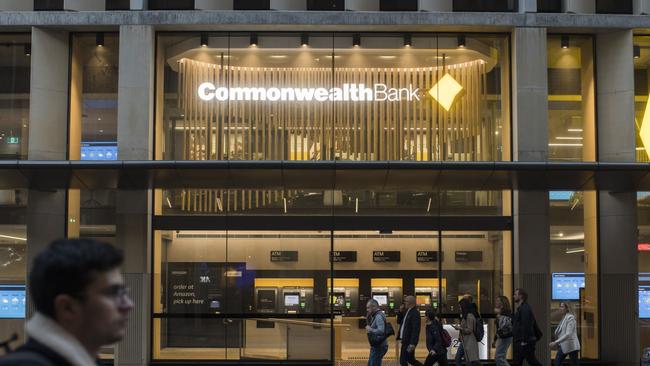CBA: Strong, profitable, wary of economic pain and slowdown
The nation’s biggest bank is preparing for a lower growth environment, but CEO Matt Comyn expects pressure on households to ease as inflation moderated across the economy.

Commonwealth Bank expects Australia’s economy and its borrowers to weather the tougher economic environment, with the bank defending its move to sit out the mortgage wars.
At its annual shareholder CBA was forced to defend the increase to chief executive Matt Comyn’s pay packet and moves by the bank to fund the Voice to Parliament yes case and plans to restrict lending to carbon intensive industries.
Speaking to shareholders, CBA chair Paul O’Malley said the bank’s borrowers were well prepared to weather tougher economic conditions, but noted “there is no doubt that many are finding the current environment very tough”.
“Many customers have been able to take practical steps to adapt to the higher rate environment,” he said.
Mr O’Malley said CBA had only seen a “small number of customers” falling behind on loan repayments.
CBA chief executive Matt Comyn said the bank was preparing for a lower growth environment, but he expected pressure on households to ease as inflation moderated across the economy.
Inflation slipped back to 6 per cent in the June quarter, according to Australian Bureau of Statistics data, down from its peak of 7.8 per cent in the December quarter.
Mr Comyn said “the fundamentals of the Australian economy remain strong”.
“At the same time, we recognise that the impacts of higher inflation and higher rates are being felt unevenly across customers and the economy,” he said.

Mr Comyn said the bank was contacting customers who were rolling off fixed rate mortgages secured during the pandemic onto higher cost variable rate loans.
“We expect pressure on households to ease as inflation continues to moderate.”
Mr Comyn said CBA was “optimistic about the outlook” of the Australian economy.
“We are well provisioned for the changing financial conditions and our strong balance sheet provides flexibility to navigate the current environment and support our customers while delivering sustainable returns,” he said.
Australia’s banks have been beneficiaries of the rapid run up in interest rates from their pandemic lows as they passed on higher borrowing costs to loan holders while holding back on passing through higher returns to depositors.
The banks have been fiercely competing for borrowers rolling off fixed rate loans, with recent market movements eroding CBA’s share of the home lending market.
Mr Comyn said pricing in the mortgage market was proving “unsustainable” with loans being offered to customers below the cost of capital.
CBA posted a $10.2bn full year profit at its recent results, with the bank forced to defend its move to hand shareholders a $10bn return through dividends and buybacks.
Mr Comyn said the size of the profit represented the weight of CBA as Australia’s largest bank.
Mr O’Malley said CBA’s profit results showed the bank’s strong balance sheet and would support Australia’s largest lender executing “our funding plans in uncertain environments, while maintaining flexibility”.
“Delivering stable earnings contributes to the strength of Australia’s banking system, helping to provide confidence and stability for businesses and consumers,” he said.
Mr O’Malley also defended the bank’s decision to grant Mr Comyn a significant increase to his total returns on the back of CBA’s bumper profit result.
Mr Comyn saw a 50 per cent pay bump to $10.42m after an increase to his short term bonuses.
Mr O’Malley told investors executives granted these kinds of bonuses were assessed against a deliberative process and reflected the performance of the bank.
“The long term compensation Matt got was granted four years ago,” the CBA chair said
“In that four-year period, our shareholders have benefited by the share price going from about $72 to around $100 for a 59 per cent total shareholder award in that term.”

However, the Finance Sector Union challenged the decision, pointing out CBA’s $16m underpayment admission to the Fair Work Ombudsman.
Mr O’Malley said CBA takes its role identifying issues very seriously.
The FSU also pinged CBA over its move not to quarantine urban branches from its move to pause bank branch closures in regional Australia until the end of 2026.
“Ultimately we’d like to be able to serve more local councils, small businesses, farmers and homeowners in regional areas to ensure the sustainability and viability of our network,” Mr Comyn said.
Shareholders took aim at CBA over a number of moves from the bank at the AGM, including its support of the Yes campaign for the Voice to parliament, as well as the bank’s funding of energy and gas projects.
Mr O’Malley noted CBA had given its customers until 2025 to prepare transition plans under the bank’s “net-zero aspirations”.
CBA has it would no longer provide project finance to new or expanded oil or gas projects “subject to Australia having a secure energy platform”.
Lobby group Market Forces it had not lodged a climate-based resolution against CBA for the first time in three years “due to its significant reduction in lending to fossil fuel expansion”.
Market Forces CEO Will Van de Pol said CBA was “miles ahead” of rivals ANZ, NAB and Westpac, but warned shareholders still had concerns over the bank’s financing of Santos and Glencore.
“From 2025, CommBank’s fossil fuel clients will only be required to align with a ‘well below 2C’ warming pathway, rather than the Paris Agreement’s far less dangerous 1.5°C goal,” he said.








To join the conversation, please log in. Don't have an account? Register
Join the conversation, you are commenting as Logout